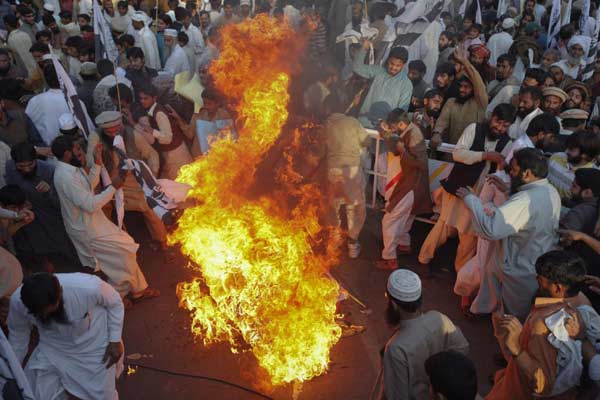Angry Pakistan to boycott Afghanistan talks
Updated: 2011-11-30 06:19
(Agencies)
|
|||||||||
 |
|
Supporters of the Islamic organization Jamaat-ud-Dawa burn a U.S flag during a demonstration against NATO cross-border attack in Lahore November 29, 2011. [Photo/Agencies]
|
Islamabad's decision to boycott next week's meeting in Bonn, Germany, will deprive the talks of a key player that could nudge Taliban militants into a peace process as NATO combat troops prepare to leave Afghanistan in 2014.
"The cabinet reaffirmed Pakistan's support for stability and peace in Afghanistan and the importance of an Afghan-led, Afghan-owned process of reconciliation," the government said in a statement.
"Pakistan looks forward to the success of this conference but in view of developments and prevailing circumstances has decided not to participate in the conference."
Pakistan's absence from the meeting of about 85 nations may not be a major setback to the process of planning Afghanistan's future as few tangible results are expected at Bonn, despite the attendance of U.S. Secretary of State Hillary Clinton and other government ministers.
But it is a blow to fostering a regional climate that will allow the United States and its allies to pull out smoothly from Afghanistan in coming years.
Defining the future
The meeting in Bonn was organized with hopes that Washington and Kabul would have reached a deal defining their relationship after foreign combat troops leave, underpinning the future presence of diplomats and aid workers.
But talks have dragged on and there is no deal yet.
Afghan President Hamid Karzai spoke to Pakistani Prime Minister Yusuf Raza Gilani on Tuesday and urged his neighbor to attend the conference.
"President Hamid Karzai asked ... for the foreign minister to participate in the Bonn Conference because Pakistan's participation is in the interest of both countries," the presidential palace said in a statement.
Some diplomats saw Pakistan's decision to pull out as an over-reaction to last weekend's border attack - the details of which remain murky.
A senior diplomat in Kabul called it "a pretty huge miscalculation."
"The agenda of Bonn does not depend on Pakistan, nor does its success depend on Pakistan," a senior British foreign office official told reporters. "But it would be better for Pakistan if she were there. There is a slight risk of the Pakistanis disenfranchising themselves."
Chancellor Angela Merkel said Germany was very discouraged to hear Pakistan had pulled out and would do what it could to persuade Islamabad to participate.
"I understand Pakistan's concern at the killing of its people by NATO but that shouldn't change the fact that this conference is very important," she told reporters in Berlin.
Officials at NATO and the Pentagon in Washington said they hoped Pakistan might still attend.
U.S. State Department spokesman Mark Toner said the conference would still be constructive without Pakistan.
"While we would like to have Pakistan there, we still think it will be a valuable opportunity to talk about Afghanistan's future," he said.
Treading lightly
The decision to pull out of Bonn appears to be the latest attempt by Pakistan to put pressure on Washington and NATO after what Islamabad says was an unprovoked attack on two combat outposts on the border with Afghanistan last Saturday.
The United States is preparing to vacate an air base in western Pakistan that has been used for U.S. drone flights but the move is not expected to have a significant effect on drone operations against militants, which have become an increasingly important part of U.S. strategy in the region.
Pakistan also reaffirmed a decision to review cooperation with the United States and NATO, another turn for the worse in a year of multiple U.S.-Pakistani crises.
In May, the United States infuriated and embarrassed Pakistan's powerful military with a unilateral special forces raid that killed al Qaeda leader Osama bin Laden.
"Despite Pakistan's continued efforts to play a positive role for stability and peace in countering terrorism and militancy in the region, the sacrifices of the nation have not been recognized," the statement said.
The Obama administration is treading lightly to avoid worsening already dismal ties between two ostensible allies.
While NATO has described the killings as a "tragic, unintended incident," it has declined to share preliminary findings from NATO and U.S. probes now underway.
"No one at this point has the complete narrative on what happened,' Pentagon spokesman George Little told reporters. "We need to be patient."
A Western official and an Afghan security official who requested anonymity said NATO troops were responding to fire from across the border at the time of the incident.
Pakistan disagrees, saying the attack lasted two hours despite warnings from the outposts and it has reserved the right to retaliate.
Both the Western and Pakistani explanations are possibly correct: that a retaliatory attack by NATO troops took a tragic, mistaken turn in harsh terrain where differentiating friend from foe can be difficult.
An Afghan Taliban commander, Mullah Samiullah Rahmani, said the group had not been engaged in fighting NATO or Afghan forces in the area at the time, although Taliban fighters control several Afghan villages near the border with Pakistan.
A similar cross-border incident on Sept. 30, 2010, which killed two Pakistani service personnel, led to the closure of one of NATO's supply routes through Pakistan for 10 days.
In the wake of Saturday's attack, the supply lines have again been shut down, leaving hundreds of supply trucks stranded in a security challenge for Pakistan.
"We are at full strength and on high alert on the highways because of the stranded trucks," said a police official in Muzaffargarh town who asked not to be identified. "We are very worried about the situation. We cannot guarantee security."
NATO supply trucks are often attacked by bandits and militants.










